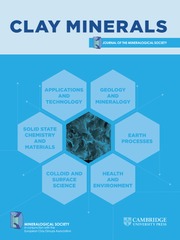Crossref Citations
This article has been cited by the following publications. This list is generated based on data provided by
Crossref.
Abdioğlu, E.
and
Arslan, M.
2005.
Mineralogy, geochemistry and genesis of bentonites of the Ordu area, NE Turkey.
Clay Minerals,
Vol. 40,
Issue. 1,
p.
131.
Takagi, T.
Koh, S. M.
Song, M. S.
Itoh, M.
and
Mogi, K.
2005.
Geology and properties of the Kawasaki and Dobuyama bentonite deposits of Zao region in northeastern Japan.
Clay Minerals,
Vol. 40,
Issue. 3,
p.
333.
Yalçin, Hüseyin
and
Bozkaya, Ömer
2006.
Mineralogy and Geochemistry of Paleocene Ultramafic- and Sedimentary-Hosted Talc Deposits in the Southern Part of the Sivas Basin, Turkey.
Clays and Clay Minerals,
Vol. 54,
Issue. 3,
p.
333.
Saltali, Kadir
and
Sarι, Ahmet
2006.
Sorption Capacity and Thermodynamic Properties of Natural Turkish (Reşadiye) Bentonite for the Removal of Ammonium Ions from Aqueous Solution.
Adsorption Science & Technology,
Vol. 24,
Issue. 9,
p.
749.
Kurunc, Ahmet
Yurekli, Kadri
and
Okman, Cengiz
2006.
Effects of Kilickaya Dam on concentration and load values of water quality constituents in Kelkit Stream in Turkey.
Journal of Hydrology,
Vol. 317,
Issue. 1-2,
p.
17.
Kadir, Selahattin
2007.
Mineralogy, geochemistry and genesis of smectite in pliocene volcaniclastic rocks of the doğanbey formation, beyşehir basin, Konya, Turkey.
Clays and Clay Minerals,
Vol. 55,
Issue. 4,
p.
402.
Önal, Müşerref
Kahraman, Sibel
and
Sarıkaya, Yüksel
2007.
Differentiation of α-cristobalite from opals in bentonites from Turkey.
Applied Clay Science,
Vol. 35,
Issue. 1-2,
p.
25.
Kadir, Selahattin
Önen-Hall, A. Piril
Aydin, S. Nihal
Yakicier, Cengiz
Akarsu, Nurten
and
Tuncer, Murat
2008.
Environmental effect and genetic influence: a regional cancer predisposition survey in the Zonguldak region of Northwest Turkey.
Environmental Geology,
Vol. 54,
Issue. 2,
p.
391.
Dogan, Hakan Mete
2009.
Mineral composite assessment of Kelkit River Basin in Turkey by means of remote sensing.
Journal of Earth System Science,
Vol. 118,
Issue. 6,
p.
701.
Yilmaz, Işık
and
Civelekoglu, Berrin
2009.
Gypsum: An additive for stabilization of swelling clay soils.
Applied Clay Science,
Vol. 44,
Issue. 1-2,
p.
166.
Yildiz, A.
and
Dumlupunar, İ.
2009.
Mineralogy and geochemical affinities of bentonites from Kapıkaya (Eskişehir, western Turkey).
Clay Minerals,
Vol. 44,
Issue. 3,
p.
339.
Arslan, Mehmet
Abdiogğlu, Emel
and
Kadir, Selahattin
2010.
Mineralogy, Geochemistry, and Origin of Bentonite in Upper Cretaceous Pyroclastic Units of the Tirebolu Area, Giresun, Northeast Turkey.
Clays and Clay Minerals,
Vol. 58,
Issue. 1,
p.
120.
Krekeler, Mark P. S.
Calkins, Clancy
and
Borkiewicz, Olaf
2010.
Mineralogical and hydrogeologic properties of a partially unconsolidated Pleistocene limestone in the east central Yucatán: implications for the development of subsurface flow constructed wetlands (SFCWs) in the region.
Carbonates and Evaporites,
Vol. 25,
Issue. 1,
p.
77.
Karakaya, Muazzez Çelik
Karakaya, Necati
and
Küpeli, Şuayip
2011.
Mineralogical and Geochemical Properties of the Na- and Ca-Bentonites of Ordu (Ne Turkey).
Clays and Clay Minerals,
Vol. 59,
Issue. 1,
p.
75.
Yalçin, Hüseyin
and
Bozkaya, Ömer
2011.
Developments in Palygorskite-Sepiolite Research.
Vol. 3,
Issue. ,
p.
175.
Sakizci, M.
Erdoğan Alver, B.
and
Yörükoğullari, E.
2011.
SO2adsorption on acid-treated bentonites from Turkey.
Clay Minerals,
Vol. 46,
Issue. 1,
p.
73.
Yılmaz, Hatice
and
Kaçmaz, Hülya
2012.
Distinguishing opaline silica polymorphs from α-cristobalite in Gedikler bentonite (Uşak, Turkey).
Applied Clay Science,
Vol. 62-63,
Issue. ,
p.
80.
Dogan, Hakan Mete
and
Kılıç, Orhan Mete
2013.
Modelling and mapping some soil surface properties of Central Kelkit Basin in Turkey by using Landsat-7 ETM+ images.
International Journal of Remote Sensing,
Vol. 34,
Issue. 15,
p.
5623.
Yilmaz, Işık
and
Marschalko, Marian
2014.
The effect of different types of water on the swelling behaviour of expansive clays.
Bulletin of Engineering Geology and the Environment,
Vol. 73,
Issue. 4,
p.
1049.
Yildiz, A.
and
Başaran, C.
2015.
Sediment-Hosted Kaolin Deposit from Çakmaktepe (Uşak, Turkey): its Mineralogy, Geochemistry, and Genesis.
Clays and Clay Minerals,
Vol. 63,
Issue. 4,
p.
235.


